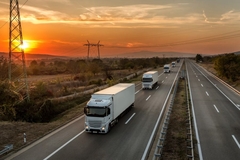
- Industry news
Industry news
- Category news
Category news
- Reports
- Key trends
- Multimedia
- Journal
- Events
- Suppliers
- Home
- Industry news
Industry news
- Category news
Category news
- Reports
- Key trends
- Multimedia
- Events
- Suppliers
Red Bull Finds Success in US Energy Drink Market

Red Bull sold 2.5 billion cans of its drink in 2005 worldwide, and has a 37.4 share of the US market, according to the trade journal, compared with 22.3 per cent for its nearest rival, Monster Energy Drink.
15/11/06 The kick from caffeine has a growing number of consumers jumping into energy drinks -- soft drinks spiked with nutritional aids and stimulants -- despite warnings from health professionals.
In the US alone, consumers gulped down 3.5 billion dollars worth of energy drinks in 2005, an 80 per cent rise from the prior year, and growth is still strong, according to industry journal Beverage Digest.
And the market for energy drinks is also surging in Europe, Asia, the Middle East and Latin America, according to the industry.
The market is led by Red Bull, made by an Austrian-based private company that started over 20 years ago and entered the US market in 1997.
Red Bull sold 2.5 billion cans of its drink in 2005 worldwide, and has a 37.4 share of the US market, according to the trade journal, compared with 22.3 per cent for its nearest rival, Monster Energy Drink.
But with competition getting fiercer, dozens of new drinks have been introduced in recent years, including from industry titans such as Coca-Cola Co., which sells its drink called Vault, and PepsiCo, which markets Josta.
The drinks are often aimed at the youth market with edgy names like Rockstar and Full Throttle, and the provocatively named Cocaine Energy Drink, which despite its name contains no illegal ingredients.
"Energy drinks have particular importance because even though the category is small, it's permium priced and disproportionately contributes to the profitability of beverage companies and retailers," said John Sicher, editor and publisher at Beverage Digest.
The typical energy drink sells for two dollars or more per can or bottle, well above the average price of traditional soft drinks.
Part of the marketing buzz comes from Internet ads and testimonials on social networking websites such as MySpace and others that promote the products.
Cocaine Energy Drink, made by Redux Beverages of Las Vegas, Nevada, has pushed the envelope with an aggressive marketing campaign calling the drink "the legal alternative."
"You are about to experience the highest energy content of ANY energy drink on the market today! -- 350 per cent greater than The Bull!," the company states on its website.
"Cocaine is not just a re-hash of existing drinks: It is a completely unique new formula -- it tastes like a fireball, a carbonated atomic fireball!"
"Cocaine" contains over 1100 milligrams of caffeine, slightly more than a large Starbucks coffee, according to the company, and among the highest in the category.
It also contains taurine, an amino acid, and guarana, a stimulant from a South American plant, as well as vitamins and other ingredients.
But experts say these drinks offer little if any nutritional value beyond what is in most soft drinks.
"It's basically caffeinated candy, and nobody needs those extra calories," said Marion Nestle, a professor of nutrition and food studies at New York University.
"Kids are hyped up enough. They don't need to be hyped up any more on sugar and caffeine."
"Energy drinks are an easy to deal with stress and provides a false sense of energy rather than true energy," adds Kim May, a nutrionist at the University of South Florida.
The use of the name cocaine as a marketing ploy has ruffled some feathers.
Joseph Califano, who heads the National Center on Addiction and Substance Abuse at Columbia University, called the Redux campaign "disgraceful."
"It is clearly aimed at children and teen partygoers," he said. "Putting a product on the market that glamorizes an illegal and addictive drug like cocaine is irresponsible and reprehensible."
Convenience store chain 7-Eleven halted sales of the Cocaine Energy Drink because "we don't want to be in a position that could encourage people to use an illegal substance," said spokeswoman Margaret Chabris.
But 7-Eleven still sells many other energy beverages and it is "a very good category for us," she added.
Red Bull USA spokewoman Patrice Radden said the drink "is popular because it works."
She said Red Bull is "an energizer" and "can be consumed in virtually any situation: during sports, at work, while driving and in leisure activities."
Radden said that contrary to some reports, Red Bull "has not been banned" in any country, but it "has not been authorized yet" in some, such as France.
She said Red Bull is sold in 130 countries and "is placing the focus of its further expansion on the markets in Turkey, Russia, Mexico, Japan, China and the Middle East."
"Having more energy to 'get it all done' has seemingly become a magic bullet in American society," the research firm said in an analysis of the US market.
Simmons Research found 31 per cent of US teens consume energy drinks, and many young adults buy the drinks as "mixers" in nightclubs.
Sicher said energy drinks are big for the youth market but that "the demographics are spreading. They are becoming a more widely consumed beverage."










